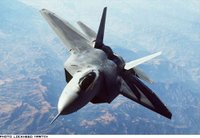 From Fighter Wing: A Guided Tour of an Air Force Combat Wing
From Fighter Wing: A Guided Tour of an Air Force Combat Wing by Tom Clancy
by Tom Clancy
In August 1914, a British aviator patrolling the skies above Mons, in Belgium, spotted the advance of von Kluck's German army toward the British Expeditionary Force. Interviewed for TV five decades later, the pilot recalled the reaction of senior officers when he reported the news...they didn't believe him. Pilots soon took cameras with them to give proof of their sightings to skeptical general officers whose vision was limited to the view from the ground.
Before long, both sides were flying reconnaissance missions, and hostile aviators were firing pistols at one another. Then machine guns. And soon after that, aircraft were designed as aerial killers - the first fighters. They were delicated, unstable constructs of wood and wire, usually underpowered by inefficient engines. But they could fly. And the learning curve was steep back then. One day, someone asked, "if you can hang one engine on an airframe, why not two, or even more? If you can see to shoot, you can see to drop a weapon, can't you?" Thus began the age of the bomber.
It was the Germans at Verdun, in the bitter weather of February 1916, who first made actual the concept we now call airpower - the systematic application of tactical aircraft to control a battlefield (the definition will change and develop). The objective was to seal off the battlefield form French aviation, denying the enemy the ranging eyes needed to see behind the German trench lines; and as it turned out, the plan didn't work terribly well. Still, others saw what the Germans tried, and recognized that it could be made to work. By the end of the war, aircraft were attacking infantry on the ground. And for the first time soldiers knew what field mice had long understood: The target of an aerial predator feels as much psychological burden as physical danger.
Between the wars, a handful of visionary officers in Britain, Italy, German, Japan, Russia, and the United Sates grappled with the theory of airpower...and with its practical applications in the next, inevitable war. The most famous of these, the Italian Guilo Douhet, proposed the first great "philosophy" of airpower: Bomber and attack aircraft can reach far into the enemy's rear to attack the factories that make the weapons and the railroads and roads and bridges that transport them to the fighting front. It was Douhet's view that airpower alone - without armies or navies - could bring victory in war. In other words, if you smash enough factories, railroad, roads, and bridges, you'll bring your enemy to the point where he will lie down and wave the white flag.
Douhet was too optimistic. An air force is remarkable not only for what it can do, but for what it cannot. The unchanging truth of warfare if that only infantry can conquer an enemy - infantry is people, and only people can occupy and hold ground. Tanks can roll across ground. Artillery can punish and neutralize ground. And airpower - where is at the heart longer-range artillery - can punish and neutralize over long distances. But only people can take up residency there.
Yet airpower can have a powerful effect...



